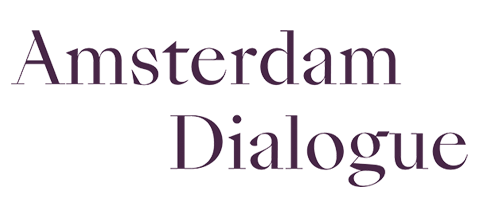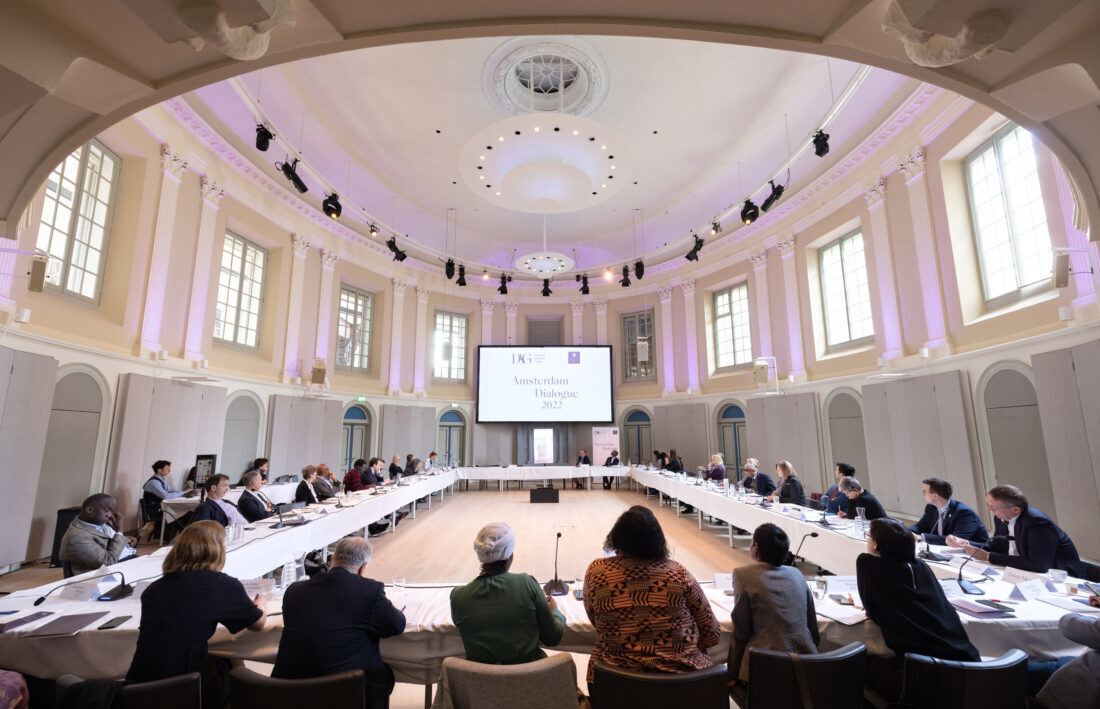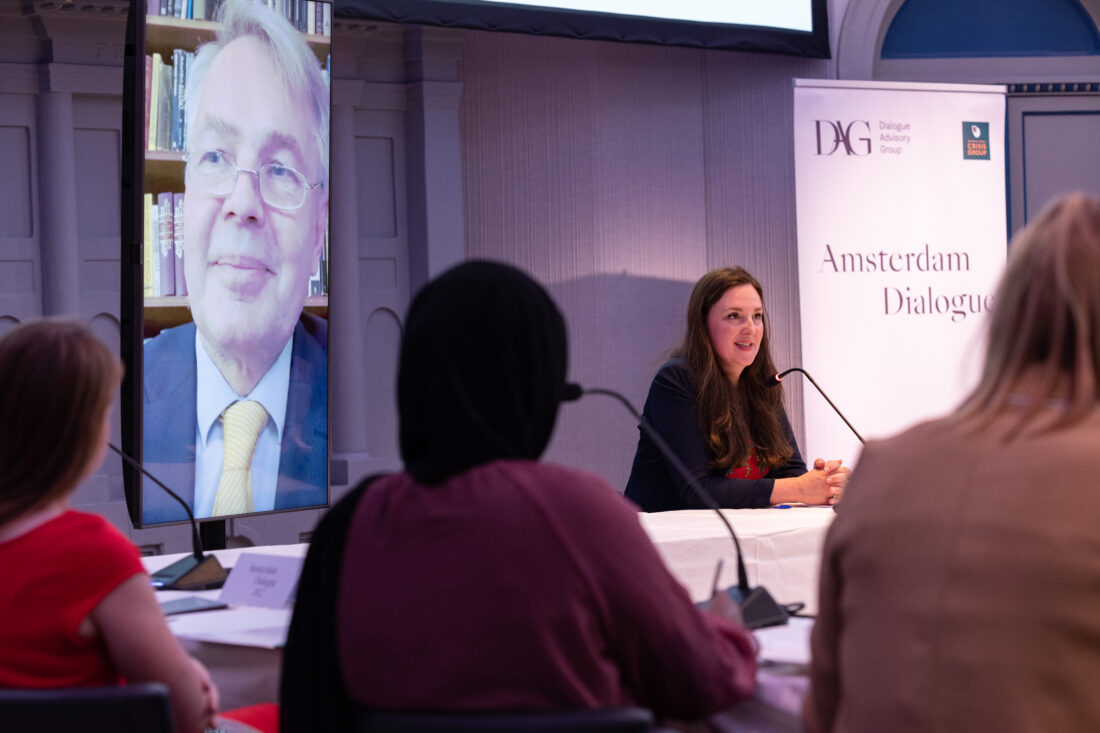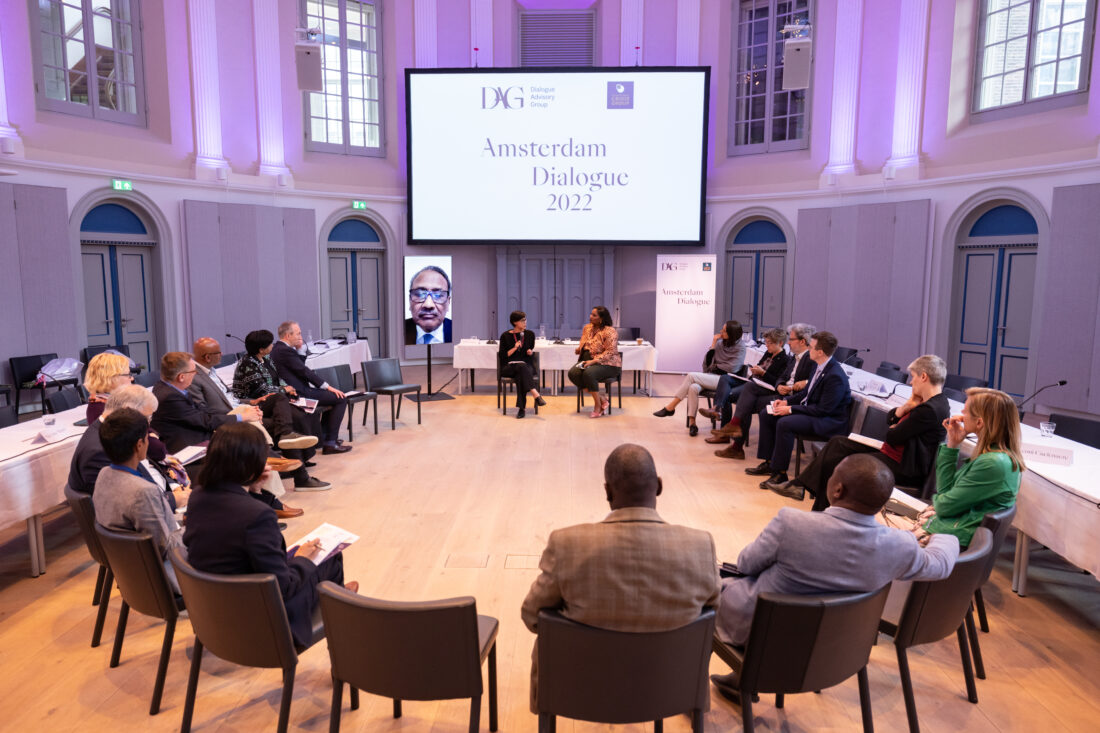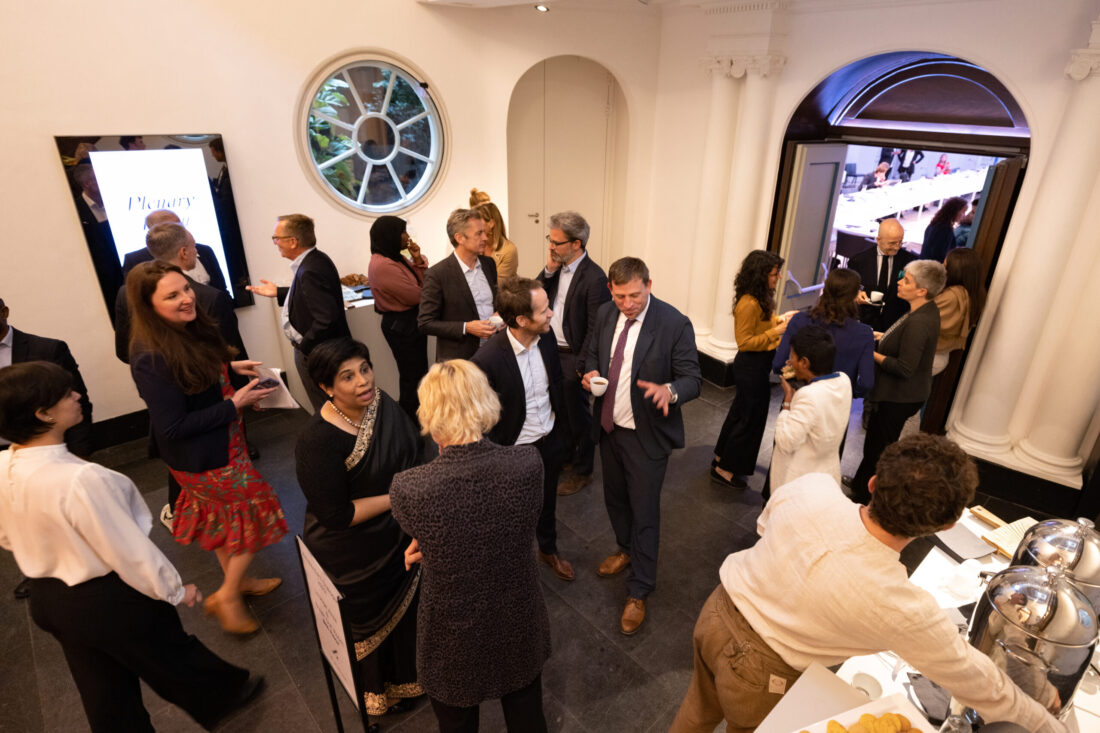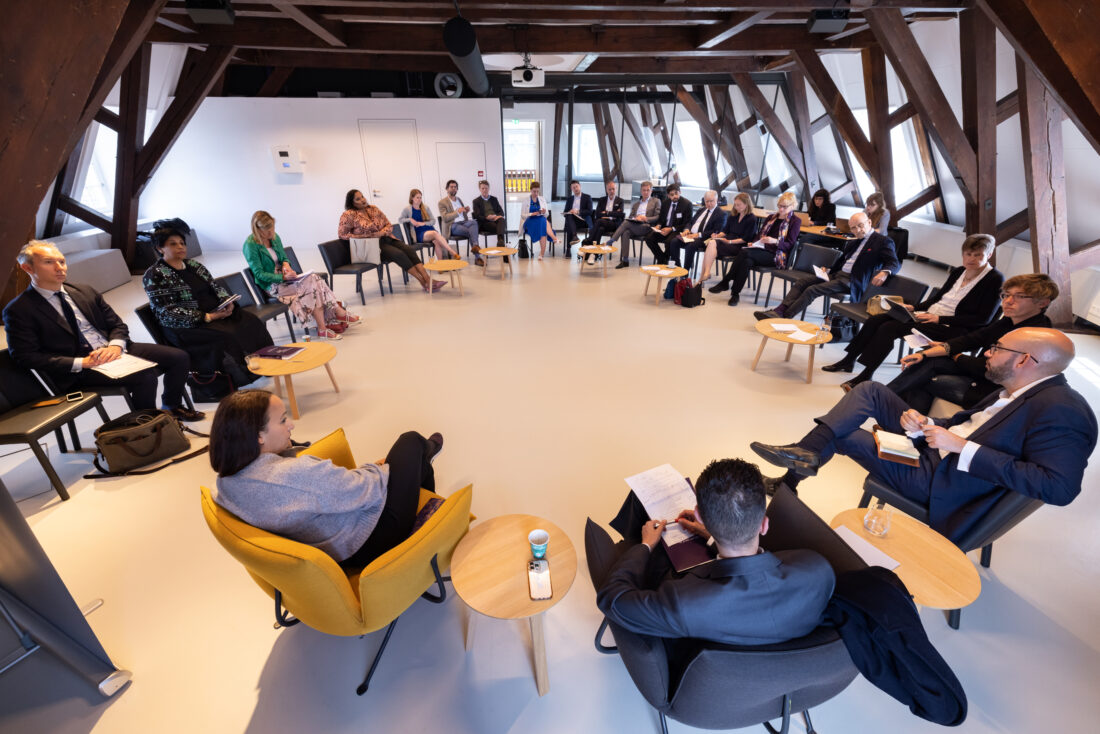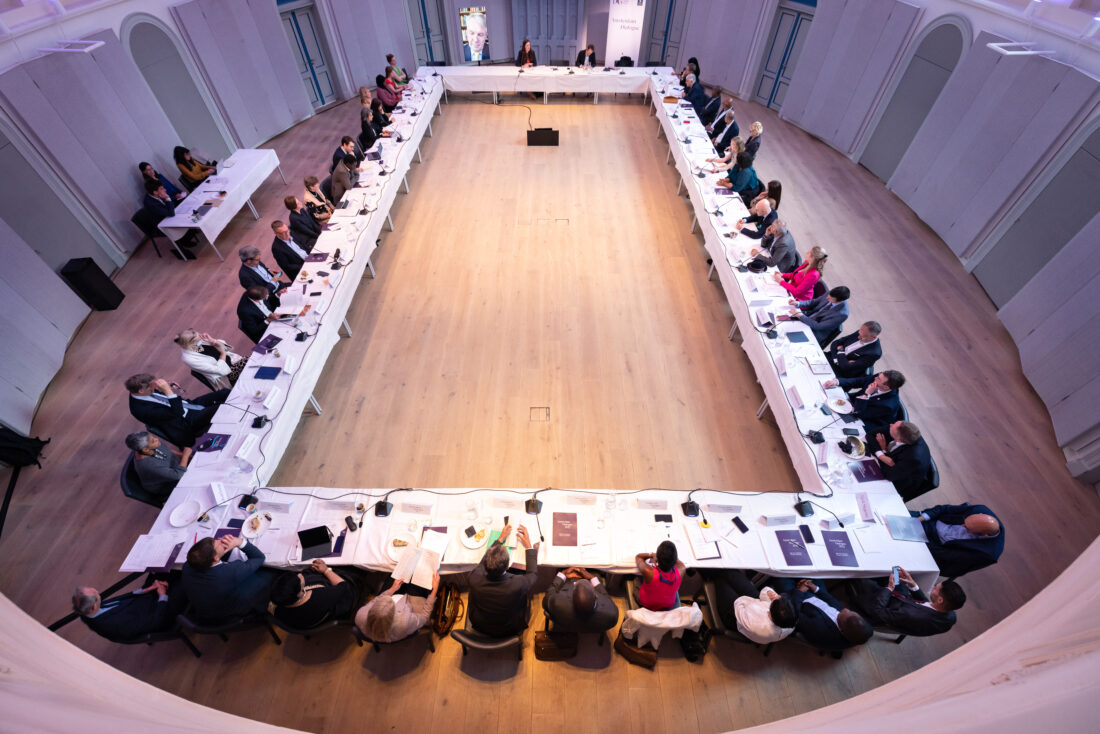Click here to view the conference report
The twelfth edition of the Amsterdam Dialogue took place on 23 and 24 May 2022. After two years of holding the Amsterdam Dialogue virtually, we were delighted to welcome participants from across the globe to Amsterdam for two days of thought-provoking discussions on peace and justice. With thirteen panels varying from Ukraine to Sri Lanka, including a Q&A session with the Prosecutor of the International Criminal Court, Karim Khan, this year’s event was the largest Amsterdam Dialogue to date.
The Amsterdam Dialogue 2022 opened with a keynote address by Finnish Minister for Foreign Affairs, Pekka Haavisto, followed by some interaction with the audience. Amidst discussions on Finland joining NATO, the session focused on how the multifaceted crisis unleashed by the war in Ukraine is altering the foreign and security landscape in Europe and beyond. This was followed by the annual Q&A session with the Prosecutor of the International Criminal Court (ICC), Karim Khan, moderated by the Director of the Dialogue Advisory Group (DAG), Ram Manikkalingam. The panel provided a valuable opportunity to reflect on the first year of the Prosecutor’s tenure and discussed opportunities and challenges for the ICC in situations where it works to advance accountability in parallel to peace efforts. In the following session, participants discussed the impact of ICC proceedings in Colombia and Venezuela, with an emphasis on the principle of complementarity. The situation between Russia and Ukraine was discussed, hereafter, with Director General of the Russian International Affairs Council, Andrey Kortunov, moderated by Richard Atwood, Executive Vice-President of the International Crisis Group. Participants discussed possible ways in which the conflict could evolve, as well as the potential for reaching a negotiated solution. The last panel of the first day discussed the situation in Darfur and Sudan with Governor of Darfur Mini Arko Minawi. Participants reflected on the root causes of the conflict, the main factors fueling violence in Sudan and expressed regret at the climate of impunity that persists in the country. The first day of the Amsterdam Dialogue concluded with a reception and live musical performance by Dyar Band.
The second day began with a keynote by Irish Minister for Foreign Affairs Simon Coveney, which focused on peace and justice and United Nations (UN) Security Council reform. The keynote led into the first panel of the day on the UN Security Council veto reform initiative with Christian Wenaweser, Ambassador of Liechtenstein to the UN, moderated by Angela Kane, former UN Under-Secretary-General. Despite the lack of traction on past reform attempts, participants welcomed the adoption in April 2022 by the UN General Assembly of a landmark resolution on veto reform to enhance accountability within the Security Council and expressed hope it would lead to improved effectiveness. This was followed by a session discussing external perspectives on the Horn of Africa with former US Special Envoy for the Horn of Africa Jeffrey Feltman and Special Envoy of the UN Secretary-General to the Horn of Africa Hanna Serwaa Tetteh. The panel discussed how international actors could constructively support efforts in the region. The next panel on Sri Lanka featured a member of the Sri Lankan Parliament, Abraham Sumanthiran, and former Sri Lankan Human Rights Commissioner Ramani Muttettuwegama. Drawing parallelisms between Sri Lanka’s current crisis and the situation in Lebanon and Iraq, participants reflected on the opportunities of channelling the energy and ideas on the streets into lasting, structural reforms.
Two breakout panels followed, addressing the situation in Libya and the transnational links between armed groups in Central and Southern Africa with a focus on the Democratic Republic of the Congo (DRC) and Mozambique. In a candid exchange, participants discussed the causes behind the failure of past political processes in Libya, the lack of a longer-term strategy, both at a national and international level, and the pervasive climate of impunity that is impacting the country. In parallel, experts on the DRC and Mozambique discussed the nature and evolution of two armed groups in the region, the Allied Democratic Forces (ADF) in eastern DRC and the Ahlu Sunna wa Jama (ASWJ) in northern Mozambique. Topics that came up in this session were the impact of foreign elements, the influence of transnational links and the consequences of the recent international military operations against both groups.
Participants gathered hereafter again for a plenary session on Ukraine in which they discussed the implications of a protracted conflict, the role of the international justice system in Ukraine, and the influence of historical narratives on Russian and Ukrainian positions in the conduct of international affairs. The Amsterdam Dialogue concluded with two breakout panels on Sudan and Syria. The discussion on Sudan centred on the current dilemmas civilian political actors in Sudan are facing regarding their engagement with the military and how to agree on a common roadmap to come out of the current impasse. In the session on Syria, participants noted that, while justice remains elusive, there have been some small steps taken in the fight against impunity by citizens and researchers, as well as through legal proceedings in national courts outside of Syria on the basis of universal jurisdiction.
Agenda day 1, Monday 23 May
12:15 – 12:45 Registration
12:45 – 13:00 Opening remarks
- Richard Atwood, Executive Vice-President, International Crisis Group
- Fleur Ravensbergen, Deputy Director, Dialogue Advisory Group
13:00 – 13:30 Keynote address
- *Pekka Haavisto, Minister for Foreign Affairs, Finland
13:30 – 13:45 Break
13:45 – 14:45 Q&A with the International Criminal Court Prosecutor Karim Khan
- *Karim Khan, Prosecutor, International Criminal Court
- Moderator: Ram Manikkalingam, Director, Dialogue Advisory Group
14:45 – 15:45 Colombia and Venezuela: ICC and Complementarity
- Mariano de Alba, Senior Advisor, International Crisis Group
- Juanita Goebertus Estrada, Congresswoman, Colombian Congress
- Moderator: Priscilla Hayner, Senior Mediation Adviser, UN Standby Team of Mediation Advisers
15:45 – 16:00 Break
16:00 – 16:45 Russia and Ukraine: A Conversation with Director General Andrey Kortunov
- *Andrey Kortunov, Director General, Russian International Affairs Council
- Moderator: Richard Atwood, Executive Vice-President, International Crisis Group
16:45 – 17:00 Break
17:00 – 17:45 A Conversation with Governor of Darfur Mini Arko Minawi
- Mini Arko Minawi, Governor of the Darfur Regional Government & Chair of the Sudan Liberation Movement – Mini Minawi
- Moderator: Ram Manikkalingam, Director, Dialogue Advisory Group
17:45 – 18:30 Reception with live music by Dyar Band
19:30 Dinner
Agenda day 2, Tuesday 24 May
08:30 – 09:00 Arrival at venue
09:00 – 10:00 Keynote Address and Panel Discussion on the Reform of the Veto Power in the UN Security
- Simon Coveney, Minister for Foreign Affairs, Ireland (recorded message)
- Christian Wenaweser, Ambassador of Liechtenstein to the United Nations in New York
- Moderator: Angela Kane, Former UN Under-Secretary-General; Vice President, International Institute for Peace; Chairperson of DAG’s Board of Directors
10:00 – 11:00 The Horn of Africa: External Perspectives
- Frederic Ngoga Gateretse, Head of the African Union Border Programme and Focal Point for Partnerships at the Political Affairs, Peace and Security Department of the African Union Commission (recorded message)
- Jeffrey Feltman, Former US Special Envoy for the Horn of Africa
- *Hanna Serwaa Tetteh, Special Envoy of the Secretary-General to the Horn of Africa, United Nations
- Moderator: Murithi Mutiga, Program Director for Africa, International Crisis Group
11:00 – 11:30 Break
11:30 – 12:30 Sri Lanka
- Ramani Muttettuwegama, Former Human Rights Commissioner
- Abraham Sumanthiran, Member of the Sri Lankan Parliament
- Moderator: Jayanthi Kuru Utumpala, Women’s Rights Activist and Independent Consultant
- First comment: Robert Fadel, Former Member of the Lebanese Parliament
12:30 – 13:30 Lunch
13:30 – 14:30 Parallel Break-out Panels
Democratic Republic of the Congo & Mozambique: Transnational Links between Armed Groups in Central and Southern Africa
- Salvador Forquilha, Senior Researcher, Institute for Social and Economic Studies
- *Maïa Trujillo, DRC Consultant
- Moderator: Dino Mahtani, Independent Expert
Libya
- Tarek Megerisi, Senior Policy Fellow, European Council on Foreign Relations
- Misbah Omar, Researcher, Peacemaker Libya
- Elham Saudi, Director, Lawyers for Justice in Libya
- Moderator: Raphaëlle Guillon, Special Advisor, Dialogue Advisory Group
14:30 – 16:00 Ukraine
- Ida Sawyer, Crisis and Conflict Director, Human Rights Watch
- Olena Snigyr, Head of the Department of Informational and Analytical Support, Ukrainian Institute of National Remembrance
- Moderator: Fleur Ravensbergen, Deputy Director, Dialogue Advisory Group
16:00 – 16:30 Break
16:30 – 17:30 Parallel Break-out Panels
Sudan
- Kholood Khair, Managing Partner, Insight Strategy Partners
- *Nureldin Satti, Ambassador of Sudan to the US
- Moderator: Luvy Rocha Rappaccioli, Senior Programme Manager, Dialogue Advisory Group
- First comment: *Suliman Baldo, Founding Director, Sudan Transparency and Policy Tracker
Syria
- Rahaf Aldoughli, Lecturer, Lancaster University
- Uğur Ümit Üngör, Professor of Genocide Studies, NIOD Institute Amsterdam
- Moderator: Ali Aljasem, PhD Candidate, Utrecht University
17:30 – 18:00 Closing Remarks
*Panelists with an asterisk before their name attended the conference virtually.
